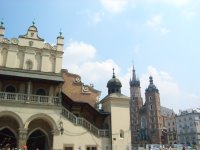Krakow: Part II, The Surprise
 I spent next to nothing on food in Krakow. Each morning, my hotel set out a breakfast spread of breads, rolls, cheeses, meats, jams, fruits, yogurt, cereal, and potted chicken terrine (that tin’s label required a few flips through my Polish-food dictionary). For lunch, I ate at “milk bars”—cheap Polish cafes where you order at the counter and pick up your food when it’s called. I wasn’t prepared for how cheap the food would actually be: a plate of pierogies, for example, was 4.80 zloty—less than $3. A plate of potato pancakes smothered in mushrooms was roughly the same amount. For two dinners, I had a huge, delicious gyro from a storefront—about $2. One night, I ate in a restaurant recommended by a friend of a friend of Andrew’s. I had borscht (served in a mug) and a big plate of pierogies for less than $10, in a charming atmosphere. The bread I was served before the meal came with a small pot of lard. On my last night, I ate at another charming Polish restaurant and had fried ewe’s milk cheese and a big bowl of pierogies. On this particular day, I ate pierogies for both dinner and lunch—impossible to tire of them.
I spent next to nothing on food in Krakow. Each morning, my hotel set out a breakfast spread of breads, rolls, cheeses, meats, jams, fruits, yogurt, cereal, and potted chicken terrine (that tin’s label required a few flips through my Polish-food dictionary). For lunch, I ate at “milk bars”—cheap Polish cafes where you order at the counter and pick up your food when it’s called. I wasn’t prepared for how cheap the food would actually be: a plate of pierogies, for example, was 4.80 zloty—less than $3. A plate of potato pancakes smothered in mushrooms was roughly the same amount. For two dinners, I had a huge, delicious gyro from a storefront—about $2. One night, I ate in a restaurant recommended by a friend of a friend of Andrew’s. I had borscht (served in a mug) and a big plate of pierogies for less than $10, in a charming atmosphere. The bread I was served before the meal came with a small pot of lard. On my last night, I ate at another charming Polish restaurant and had fried ewe’s milk cheese and a big bowl of pierogies. On this particular day, I ate pierogies for both dinner and lunch—impossible to tire of them.One night mid-trip, I decided to go up a notch and have dinner someplace a bit fancier. The restaurant I chose has a “medieval cellar” with stone walls, rough-hewn wooden tables, and stone benches. Tall candles light the room. It was an amazing place, and I was seated at a small table for one, with my own tall candle. I ordered a Polish beer and a pitcher of water. For a starter, I had herring with apples, onions, and sour cream—delectable. I’d ordered a chef-recommended trout, billed as boneless, for my main course, expecting a filet of sorts of nice fish. What came to me was a whole fish—tail, skin, fins, head, eyes. It was indeed boneless—somehow—and delicious, but as I dug into the fishy flesh, I felt the fish-eye watching me.
About halfway through my meal, two loud Americans swept into the room and began ordering around the waitstaff. “It’s a surprise,” they said loudly. The trout and I exchanged a wary glance. “They’ll come in and ask for a table for two. Then they’ll come in and see us.” Two more Americans came in. “If we sit here in the corner, they won’t see us. Maybe they’ll actually sit down without seeing us—then we can ask them for something and shock them.” The plan was laid.
Two young people came in—perhaps a young couple—and were, duly, surprised. “Mom, Dad. Grandpa,” the girl said. She sounded resigned, even horrified. Her male friend put a better face on it: “Oh my God, you guys. Oh my God. I suspected. I thought something was up. Oh my God, you guys.” Despite my twenty-plus minutes of eavesdropping, I couldn’t make out where these people were from, what the relationship was between the couple (they didn’t exactly seem romantically entwined), or why they were being surprised; but the tenor of the conversation was exactly what you’d expect from such an event. “You should have called.” “We tried to call. Something’s wrong with the phone.” “I told you I wouldn’t have time to make a reservation.” “Well, we must be having communication problems.” “Do you have any painkillers? My back hurts more than you could possibly imagine.” “We got hotel rooms on either side of yours—isn’t that amazing?”
I looked at the trout. You see, it seemed to say. You see now, truly, how pleasant it can be to eat alone. Its fishy eye looked back at me, unblinking. Sit back. Enjoy the potatoes and the cranberry-stuffed baked apple that accompany me. Be happy you were not the one being surprised in Krakow.
Comments